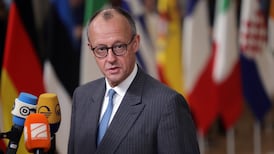Michel Barnier has warned that peace in Ireland remains at risk to "the slightest spark" amid provocative British actions over the Northern Ireland protocol.
In a postscript to The Grand Illusion, his diary of the Brexit negotiations which will be published in French on Thursday, Mr Barnier also condemns the European Commission's brief threat to trigger Article 16 of the protocol to protect coronavirus vaccine supplies.
"It was absolutely necessary for the European Commission to correct the mistake madeon 29 January very quickly," the EU's chief Brexit negotiator writes.
“That went directly against our efforts and the responsible attitude we had held during the previous four and a half years, precisely to avoid the return of a hard Border in the middle of the island of Ireland, often in the face of British provocations. And these provocations continue, unfortunately.”
Mr Barnier praises Leo Varadkar and Simon Coveney for their conduct during the negotiations but he describes how he warned the former taoiseach that Ireland must prepare for the consequences of a no-deal Brexit.
“We must be clear between us. Controls to protect the internal market must be implemented somewhere. Either around the island or inside the island. Or on the continent, with the risk of excluding Ireland from the single market, which we do not want,” he told Mr Varadkar.
Mr Barnier says Irish officials ruled out making preparations to re-establish a physical Border, suggesting that strengthening existing controls could protect the EU single market until a longer-term solution was found and calling for flexibility from other member-states and the commission.
Unionist criticism
He is critical of the inflexible approach adopted by the DUP, admitting that he struggled to remain calm during a meeting with Arlene Foster and Diane Dodds. He accuses the party of rejecting all his proposals for dealing with the issue of the Border but failing to offer realistic alternatives.
Although he expresses sympathy for Theresa May, he says he was astonished when in the then prime minister's January 2017 Lancaster House speech, she laid out Britain's red lines, including leaving the single market and the customs union.
“Have the consequences of these decisions been thought through, measured, discussed? Does she realise this rules out almost all forms of cooperation we have with our partners?” he writes.
“I am amazed at the way the prime minister has shown her hand.”
He suggests that Boris Johnson waited until the result of the US presidential election in November 2020 was clear before dropping the clauses of the Internal Market Act which would have allowed the British government to unilaterally suspend the protocol.
Mr Barnier recalls his involvement in channelling EU funds to support the peace process in Northern Ireland when he was a European commissioner and describes his feelings at the start of the Brexit negotiations after meeting people who lived along the Border.
“I promised myself in this negotiation not to fuel the polemics and attacks from the British tabloids, to pay attention to the words I use, to stick to the facts, the figures, the legal fundamentals, in short, to leave little room for emotion and feelings, for the sake of objectivity. But here in Ireland . . . it is difficult not to be touched by the sensitivity, the emotion of those who express themselves, the memories that remind me of this tragedy,” he writes.











